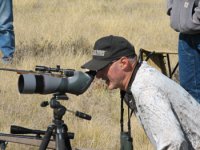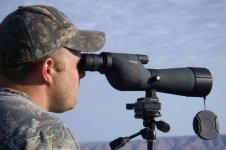Hi,
Your projecting and putting words in my mouth
I'll give you some highlights in direct quotes:
I don’t understand why you make an argument against straight spotting scope if you don’t know what natural point of aim is in the first place. Your discrediting something that can be beneficial for those already trained in it.
I’m not a teacher, someone is much better taking a course or learning on their own how to utilize NPA. There is plenty of information out there.
Re-iterated in re-phrased form as:
If you don’t understand NPA you won’t get it, as shown in what you wrote so far. Plus many of those points are completely false. But that’s ok enjoy your angled scope.
If that doesn't light up your arrogance-o-meter all over the scale, you might want to have it checked by customer support as surely, something must be wrong with it.
Especially as all the while you were evading to actually deal with the contents of my arguments, other than dismissing them summarily.
If you're ready for a factual discussion on a content level, points #2 to #6 still remain to be answered by you.
I made a case for straight scopes in SOME applications. Yet you wanted make an argument against it when you are not even familiar with it.
B1) So why exactly do you think I'm not familiar with straight scopes?
Not that it should matter what you think I'm familiar with or not, but you're taking the ad hominem road there, so I'm asking you to explain yourself. (Ad hominem typically is a big no-no in online forums, for good reasons.)
With regards to "arguments against" straight scopes (actually, it's a factual list of disadvantages), they are up there, numbered for easy reference, so go ahead and make proper ad rerum arguments. I do actually invite disagreement, as long as it's rational and factual.
As far as number 1, many hunters are ultra lighters and count grams and ounces in their tripod selection. There are several lightweight tripods available for straight scopes. Unlike most birders, many hike for days with these lightweight tripods
1) That's a good ad rerum argument, thanks. After considering it thoroughly, I'd say I disagree with it: Whatever lightweight technology you use for a tripod, you still need a smaller tripod for an angled scope than for a straight one, and everything else being equal, a smaller tripod is going to be lighter than a bigger tripod.
What you are describing is hunters weighing their options and accepting the disadvantage that comes from the use of an angled scope. That's a valid strategy, and the existence of light-weight tripods (which are not necessarily suited for all birding applications) might reduce the negative impact of the straight scope's disadvantage to a neglegible measure.
Let go of trying to be right and allow readers to make decisions objectively in their purchase by having the information on the benefits of each design. Instead of dismissing concepts you admittedly have no experience in.
I'm not dismissing the concept, I'm asking you to explain it. If you can't, it's really your turn to let go of being right.
Abandoning perfectly good factual statements in the absence of ad-rerum arguments would be irrational, so I stand by the statements I made in this thread. I'm quite confident they are clear enough to allow beginners to reach their own conclusions, diligent reading assumed.
Regards,
Henning







